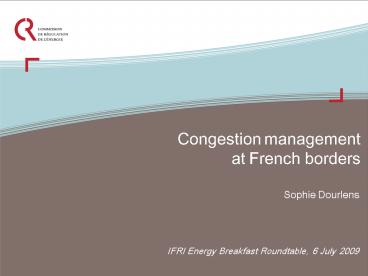Congestion management at French borders - PowerPoint PPT Presentation
1 / 16
Title:
Congestion management at French borders
Description:
But it seems insufficient for a true electricity market integration of France ... interconnection capacity in full consistence with prices of Power Exchanges, ... – PowerPoint PPT presentation
Number of Views:46
Avg rating:3.0/5.0
Title: Congestion management at French borders
1
Congestion managementat French borders
Sophie Dourlens
IFRI Energy Breakfast Roundtable, 6 July 2009
2
Interconnection capacities at French borders
- France average exchange capacity
- around 13,000 MW for export
- around 8,000 MW for import
- Compared to the generation capacity in France
(109,000 MW), it is close to the Barcelona target
of 10
- But it seems insufficient for a true electricity
market integration of France with neighbouring
countries
imported electricity lt 7 of consumption
3
Interconnection capacities at French borders
- A natural question comes
Do we need more interconnection capacities at
French borders?
4
Market price differentials
- Hourly price convergence between French and
neighbouring markets
Source CREs third report on interconnection
management and use
Except on the French-Belgian border, electricity
markets are far from integrated!
- Another question
Except on the French-Belgian border, is market
integration reachable without investing in new
capacities?
5
Use of French interconnections
- Since prices diverge during about 90 of time at
French borders, interconnection capacities should
be fully used
0
Cross-border capacities are not used as they
should be!
Source CREs third report on interconnection
management and use
6
The case of the French-Belgian interconnection
- Borders between France, Belgium and The
Netherlands are managed with the so called
Trilateral market coupling (TLC)
- This mechanism allows for using interconnection
capacity in full consistence with prices of Power
Exchanges, by managing interconnection capacity
together with the economic merit order of bids
and offers at the 3 markets
Source CREs third report on interconnection
management and use
7
Price convergence within the TLC markets
- The introduction of the TLC caused a strong price
convergence between wholesale organised markets
in France (Powernext), Belgium (Belpex) and The
Netherlands (APX)
Source CREs second and third reports on
interconnection management and use
8
The case of other French interconnections
- Other interconnections of France with Member
States are managed with day-ahead explicit
auctions
- This means that capacity and energy markets are
separated to make a cross-border trade, market
participants have to - buy (or produce) energy in one country,
- buy explicitly the interconnection capacity, and
- sell (or consume) energy in the other country
- These successive different stages, operated each
day, cause inefficiencies in the use of
interconnections
9
Example French-German interconnection
- Utilisation rate of French-German interconnection
compared to price differential between wholesale
organised markets in France (Powernext) and
Germany (EEX)
Source CREs third report on interconnection
management and use
10
Economic consequences
- Assessment of the loss in social welfare due to
the absence of market coupling at French borders
Source CREs third report on interconnection
management and use
11
A first conclusion
- At some borders investments in new
interconnection capacity may be needed
Source CREs third report on interconnection
management and use
But at all borders, improvements in
interconnection management and use should be a
short-term priority!
12
And a new question
How does CRE work for improving interconnection
management and use?
13
Regional initiatives
- In 2006 European Commission together with
European Energy Regulators launched the Regional
Initiatives in gas and electricity
- In electricity there are 7 regions among which 4
involve France
14
Regional initiatives
- Regulators, TSOs, Power Exchanges and market
participants work together in the framework of
these regional initiatives
- Several projects aiming at improving
interconnection management methods are discussed
within this framework
- For example, stakeholders in the Central-West
region are working at extending the Trilateral
Coupling (France, Belgium, The Netherlands) to
Germany
There are many other examples of projects aiming
at integrating electricity markets in each region!
15
CREs monitoring reports
- Each year CRE publishes extensive reports on
interconnection management and use at French
borders
- The 1st report (published in May 2007) aimed at
assessing the consequences of the implementation
of market-based and non discriminatory mechanisms
for interconnection capacity allocation at French
borders
- The 2nd report (published in June 2008) aimed at
monitoring the existing mechanisms, explaining
the target mechanisms agreed between all
stakeholders and drawing up a list of the
important issues still to be resolved to achieve
these targets
- The 3rd report (published very soon) aimed at
monitoring the existing mechanisms, defining the
current status of the discussions in progress for
each of the 4 regional initiatives in which the
CRE is involved and presenting the perspectives
and the issues at regional and European level
16
CREs monitoring reports
- The 3 reports are downloadable in French and in
English - http//www.cre.fr/
Thank you for your attention!































